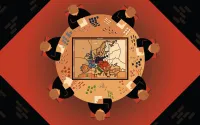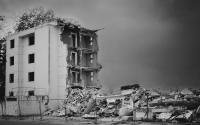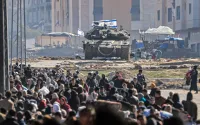Common Dreams / Published on Tuesday, August 26, 2003 by the New York Times
Last week a quietly scathing report by the inspector general of the Environmental Protection Agency confirmed what some have long suspected: in the aftermath of the World Trade Center's collapse, the agency systematically misled New Yorkers about the risks the resulting air pollution posed to their health. And it did so under pressure from the White House.
The Bush administration has misled the public on many issues, from the budget outlook to the Iraqi threat. But this particular deception seems, at first sight, not just callous but gratuitous. It's only when you look back at budget politics in 2001 that you see the method in the administration's mendacity.
A draft E.P.A. report released last December conceded that 9/11 had led to huge emissions of pollutants. In particular, releases of dioxins — which are carcinogens and can also damage the nervous system and cause birth defects — created "likely the highest ambient concentrations that have ever been reported," up to 1,500 times normal levels. But the report concluded that because the outdoor air cleared after a couple of months, little harm had been done.
In fact, the main danger comes from toxic dust that seeped into buildings and remains in carpets, furniture and air ducts. According to a recent report in Salon, businesses that did environmental assessments of their own premises found alarming levels not just of dioxins but also of asbestos and other dangerous pollutants. So the most shocking revelation from the new report is that under White House direction, the E.P.A. suppressed warnings about indoor pollution. Scattered evidence suggests that as a result, hundreds of cleaning workers and thousands of residents may be suffering chronic health problems.
Why was crucial information withheld from the public? The report mentions "the desire to reopen Wall Street and national security concerns." Maybe — though the national security benefits of failing to remove toxic dust escape me. I suspect that there was another reason: budget politics.
Immediately after 9/11 there was a great national outpouring of sympathy for New York, and a natural inclination to provide generous help. President Bush quickly promised $20 billion, and everyone expected the federal government to assume the burden of additional security. Yet hard-line Republicans never wanted to help the stricken city. Indeed, according to an article by Michael Tomasky in New York magazine, Senators Phil Gramm and Don Nickles attempted to slash aid to New York within hours of Mr. Bush's promise.
Matters were patched up sufficiently so Mr. Bush could make his triumphant appearance at ground zero the next day. But then the backtracking began. By February 2002, only a fraction of the promised funds had been allocated — and Mitch Daniels, the White House budget director, accused New York's lawmakers of playing "money-grubbing games."
Why this stinginess? A source told Mr. Tomasky that "Gramm just doesn't like spending money. And Nickles . . . he's just anti-New York." That sums it up: even after 9/11, hard-line conservatives opposed any spending, no matter how justified, that wasn't on weapons or farm subsidies, while some people from America's "red states" just hate big-city folk.
What does all this have to do with toxic dust? Think how much harder it would have been to stiff New York if the public had understood the extent to which Lower Manhattan had become a hazardous waste site. I can't prove that was what administration officials were thinking, but otherwise their efforts to play down the risks seem incomprehensible.
In the end, New York seems to have gotten its $20 billion — barely. As for the additional help everyone expected: don't get me started. There wasn't a penny of federal aid for "first responders" — like those firefighters and police officers who cheered Mr. Bush at ground zero — until a few months ago, and much of it went to sparsely populated states. The federal government spends much more protecting the average resident of Wyoming from terrorists than it spends protecting the average resident of New York City.
All in all, the people running Washington, while eager to invoke 9/11 on behalf of whatever they feel like doing, have treated the city that bore the brunt of the actual attack very shabbily. In September 2004 the Republicans will hold their nominating convention in New York. Will New Yorkers take the occasion to remind them about how the city was lied to and shortchanged?






